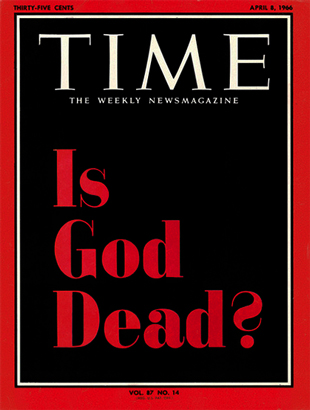It must have been exhilarating to preside over the death of God and the triumph of the secular self. Those were heady days in the 1960s and 1970s when the doctrines of Scripture and the moral markers of life's boundaries were all under challenge. Though we might fault the arrogance of someone like Cox in deciding that God is either dead or irrelevant, it is exactly the sin of Eden that has proven impossible to break away from. One of the central consequences of the death of God is the perception of a freedom that seems to be empowering but with comes the stark consequence of death and a meaningless, random, and pointless existence that surely should be terrifying to us. That it is not is ample evidence of our own preoccupation with the moment and self to our eternal detriment. To kill God is hardly to do anything to Him but it does the terrible to us. In the absence of God, man must become god and a pantheon of gods as many as their are people. In the vacuum created by God's departure, man as an individual is left to create his own value system and that value systems will inevitably compete for dominance. Without the sacred, the secular will erect its own temples, its own rituals, and its own sacraments to transcend the prison of the moment. Devoid of the voice of God to instruct us in the meaning and value of our lives, every individual is left to discover and define his or her own meaning of life and that brings the competing definitions into conflict. Without the sacred to anchor life, every person is adrift in their own lifeboat.
It is not enough then to desecrate and destroy the remnants of what was once sacred. They must be replaced and their memory rendered abhorrent. Surely this is where we are at today. It is not enough that the forces against Christianity must challenge all that is Christian but they must co-opt Christianity itself until it becomes a vehicle for the secular, a mere echo of the voice of culture and self. After this, the same powers must make it illegal to confess what had been in history and dogma and not simply allow it to become irrelevant. If left unchecked, all the liberties we once enjoyed will be constrained for the sake of the new truths and new deities of the individual self. Of course, the soft underbelly of it all that the self is not free but must live within the confines of what culture deems acceptable. The triumph over God is short-lived and soon surrenders to the defeat of anything that transcends the moment. In the end, we have nothing to hold onto in the face of death and nothing to pass on to those who follow us except the tyranny of self, the pursuit of present pleasures, and the peace made with death in order to justify it all. God is not wounded by our arrogance but we are made poor and left to the wretchedness of our own excesses until nothing is left to sustain hope and nothing to constrain the violence that will inevitably arise within.

No comments:
Post a Comment